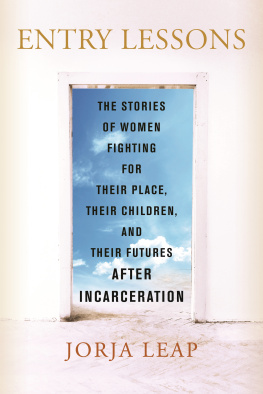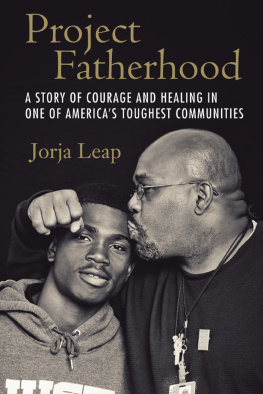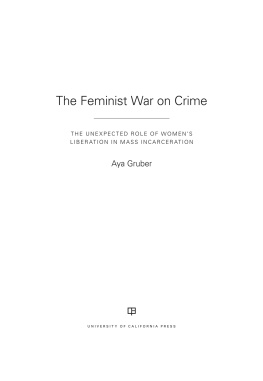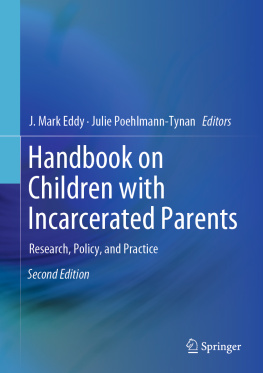ALSO BY JORJA LEAP
Jumped In: What Gangs Taught Me About
Violence, Drugs, Love, and Redemption
(Beacon Press, 2013)
Project Fatherhood: A Story of Courage and Healing
in One of Americas Toughest Communities
(Beacon Press, 2014)

This book is for Karrah Lompa and Elie Miller
and in memory of Thea Ernie and Beatriz Solis.
It is also for all the women in these pages who
gave me their time and their trust.
I didnt need reentry services. I needed entry serviceslike how do you enter into a normal life? Reentry is a lie; its the wrong word. What we need is help on how to heal, how to live, how to enter this world.
DENISE MARSHALL
Put simply, we know that when we incarcerate a woman we often are truly incarcerating a family, in terms of the far-reaching effect on her children, her community, and her entire family network.
LORETTA LYNCH , former US attorney general
PART ONE
THE JOURNEY IN
ONE
SLEEPWALKING
At Homegirl, we all understand each other. Were a family. Theres so much pain and so much love.
SHAYNA WELCHER
T he Homegirl Caf was operating with total efficiency. That could only mean something was really wrong. The homegirls were ordinarily the liveliestand worstwaitresses imaginable, full of laughter and chatter while ignoring the customers who waited patiently for their water or their food or their check. Usually this only got worse before the last table was cleared and the doors were locked for the night. But today was different. The atmosphere in the caf felt more like a prayer meeting than a party, the women delivering plates and checks with silent precision.
Erika Cuellar, one of the caf directors, wasnt on the floor, which made the ballet of organization even more alarming. I found her in back, outside the building, behind the kitchen. When she turned toward me, I saw shed been crying.
So. You heard what happened?
No. Youre scaring mewhat is it?
Its Janeth. She got locked up. I looked at Erika closely. This news was not exactly remarkable. We were at Homeboy Industries, for Gods sake.
For what?
Murder. You knowtheyve been trying to find who killed that church deacon. Now they know. Pedro Martinez shot him. Ivy and Janeth were with him. Im not sure what happened. But thats why they arrested Janeth last night. Elie thinks her bail is going to be over a million dollars.
Erika started crying again while I stood still, trying to make some sense of her words.
I was used to people getting locked up. While criminal justice reform had growing support on both sides of the aisleor so we kept hearingevidently the Los Angeles Police Department and the Sheriffs Department hadnt gotten the memo. Instead, almost everyone in law enforcement had only one thing on their minds: how to maintain the 40 percent drop in crime that in late 2012 was being touted as a historic low. So, people got locked up on suspicion. A crime was reported and then it was time to round up the usual suspectsparticularly if they had tattoos and were hanging out in an area under a gang injunction. More often than not, after a few days passed, they were released. Invariably, it all came down to a technicality: It was a DA reject, or They found the right guy, or The charges wouldnt stick. Actually, the reality was that there just wasnt enough room in the LA County jail to detain every suspect, particularly for cases that were weak or lacked physical evidence. On any given day, twenty-two thousand men and women were locked up in some part of CJ, as the homies referred to the county jail, most of them awaiting the disposition of their case. Because of this, there was constant pressure to sort cases out. Additionally, if an arrest involved drug possession, the person charged would most likely go to drug court and then a rehab program. Cases rarely went to an actual trial. But a charge of homicide was different. And this one involved a church deacon, a violent gang member, and two women who were on the scene during the commission of the crime.
Everything about it was different.
No one ever thought of homegirls as murderers. Gang life was gendered, and women played supporting roles. They were girlfriends, or hood rats, or baby mamas. They were extensions of the male identityreadily available, on call as accomplices, personal assistants, characters in the gender cartoon of criminal behavior. Yknow, women are supposed to be baby mamas. Maybe they do a little dealing on the side. But come on, theyre not criminals; theyre women, one gang member had patiently explained to me, as if talking to an idiot. Their drug dealing sounded as innocent as having a Tupperware party or selling costume jewelry to make extra money. For women, crime was not a careerit was just a practice to generate petty cash, some pin money for the little lady. I hid my dope in my babys diaper bag and even right in his diaper, Joanna Bright Eyes Carillo once told me. I just made a little money on the sideI could buy baby clothes or a dress, and I wouldnt have to ask my man for any money. I could get something for the house. When women talked about the minor crimes they engaged in, it all sounded so domestic, not worthy of any major public policy intervention.
If a woman actually engaged in violent activityeven murdered someoneit was usually with cause. I had already heard three separate stories from women at Homegirl. Each of them knew a woman who had killed a man because he had raped her, or sexually abused her, or repeatedly beaten her. Or all three.
Given all that, what could explain the run-up to this particular murder? Both women were mothers, both had experienced major traumas, and both struggled with their trauma and their recovery. So much had already happened to them in their lives. I knew Janeth had been involved for years with Luis, whod fathered her daughter, Angelina. He was involved in gang activity, cheated on her, and beat her repeatedly, but she always wound up taking him backshe felt she had no one else in the world.
I also knew that Carlos, the father of Ivys son, Jessie, was locked up long-term, and Ivy had been alone for a long time, insisting she didnt want to be involved with anyone. Ivy herself had been locked up, and when she was released from prison, all she cared about was Jessie and being a good mother to him. No one knew why shed ever gotten involved with Pedro Martinez, the alleged shooterwho wasnt part of the recovery-based world of Homeboy Industries. Even if he was attractive, as many of the homegirls found him, he was older, hed been locked up, and he was still an active gang member. The women in the caf worried about Janeths and Ivys involvements with such troublesome menespecially Pedro. While some of Luiss behavior was blamed on his youth and stupidity, Pedro was judged more harshly when it got out that hed been beating Ivy. In gang life, you were supposed to handle your business, take care of your family, keep everything under control. You werent supposed to beat your lady. Because of this, the homies had no love for Pedro, while the homegirls all worried about the pain both men inflicted and its impact on Ivys son and Janeths daughter.
Was it just the two of them? Was anyone else with them? What happened? Who got picked up? I kept asking questions without waiting for Erika to answer. Something inside of me just didnt want to know. I knew Ivy and Janeth were both struggling, trying to recover from trauma, not get involved in more of it.









